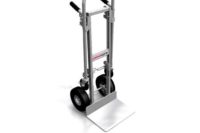Regulatory and environmental concerns have led manufacturers to make enhancements to their products. Let’s take a look at some of the developments.
The need to comply with the Environmental Protection Agency’s Tier 4 and California Air Resources Board regulations has driven some of the developments at Carrier Transicold, said Dave Kiefer, the company’s director of marketing and product management. The X4 series platform uses less power, is 5% to 20% more fuel efficient and weighs less than other equipment.
Thermo King’s Director of Product Management and Marketing Doug Lenz said his company’s Thermo King S-600 meets EPA’s requirements. The unit has new diesel direct-electric architecture, achieved in collaboration with PSA Peugeot Citroën, which meets emissions requirements in the greater-than-25 horsepower category. It reduces particulate matter by 90% and nitrogen oxide by 30% compared to the interim standards.
Cooler, more efficient trailers
With trailers a major component of successful refrigerated hauling, we reached out to the manufacturers to see what’s new. Robert Lane, Wabash’s director of products and business development, told me that the company has developed a web-based, decision-support tool called “Thermal Configuration,” which uses trailer specification and freight application data to calculate a UA rating, excess capacity and fuel cost over the projected ownership of their ArcticLite refrigerated vans. This provides information as to the best insulation package for the application by looking at how each configuration impacts fuel costs and cube capacity. The trailers have sidewall thermal breaks and are manufactured with a computer foaming system to ensure void-free sidewalls. The SolarGuard roof prevents UV rays from being absorbed into the panels.
Utility Trailer Manufacturing Co.’s Director of Marketing Larry Roland said its 3000R trailer “is the strongest and lightest-weight trailer available and is extremely thermally efficient.” As many firms use 28-foot trailers for local delivery, Utility provides various configurations. Roland said “there is no such thing as ‘stock’ trailers;” the company designs to specific requirements such as multi-temperature configurations with special bulkheads.
Marketing Director David Grant of Great Dane told me the company produces three different models; the Everest TL and SS for truckload and the CL for local or regional applications in lengths from 24 to 53 feet.
He said the Everest CL reefer provides the flexibility to configure as many three controlled temperature zones and an ambient section. PunctureGuard lining is standard and the ThermoGuard interior liner option seal the trailer’s insulation significantly, reducing out-gassing effects that cause foam insulation to degrade over time. The liners also reduce weight gain that typically occurs as traditional liners absorb water vapor.
Johnson Refrigerated Truck Bodies, a subsidiary of Great Dane, manufactures four refrigerated composite designs, each in various sizes and configurations. Johnson’s seamless fiberglass roof and wall panels are impervious to moisture. The void-free, foamed-in-place, 2.1-pound-density urethane insulation provides structural integrity and the high thermal efficiency R-values. With a proprietary, non-conductive, strong fiberglass/polyester pultrusion, there is no metal that can conduct heat from the outside into the body.
Remote-control monitoring
Regardless of refrigeration units and trailers, the ability to know what is happening with that truck is critical so the tracking equipment has become much more sophisticated.
Jim Sassen, senior manager Product Marketing for Omnitracs, said the second-generation Trailer Tracks 210, when used in connection with StarTrak Information Technologies’ StarTrak ReeferTrak system, allows the user to set and adjust temperatures on refrigerated trailers remotely.
“The second generation TT 210 now has solar-powered devices and our coverage includes the U.S., Canada and Mexico,” Sassen said. The unit has temperature history, something that will become more critical under new food transport regulations. The TT 210 offers a range of other reports, including door opening and closing, arrival, and location or inventory by landmark.
Carrier Transicold’s Kiefer said that the Food Safety Modernization Act will require greater accountability for maintaining food safety.
Thermo King’s Precedent temperature control platform can be equipped with TracKing telematics, a web-based temperature and asset management system providing the ability to remotely monitor and track refrigerated trailers. It can use cellular/Wi-Fi systems, cellular communication for over-the-road monitoring or Wi-Fi to manage assets in the yard.
All in all, the firms supplying equipment and services to the dairy industry have stepped up to make sure you do not “lose your cool.”


